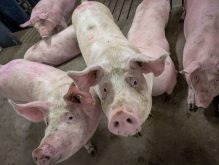Western Canadian farmers will get $5 of equity in a privatized CWB for every tonne sold to the CWB this crop year.
The offer was recently posted on CWB’s website, Gord Flaten, CWB’s vice-president for grain procurement, said in an interview. Details were issued to grain companies Sept. 19 and information is also being sent directly to farmers.
“This is a unique way for farmers to own a piece of the value chain,” Flaten said. “Farmers do not have to write a cheque to pay for the opportunity. It really is cost-free for the farmers who are going to own that equity. I think that’s an attractive part of the plan.”
Read Also

Canada’s import ban on Avix bird control system ruffles feathers
Canadian producers’ access to Bird Control Group’s Avix laser system remains blocked despite efficacy studies and certifications, as avian flu deaths rise.
“The concept is that farmers would own a piece of the company,” Flaten said. “We expect them to be a minority owners, but they would own an important portion of it.
“The farmer-ownership piece is something we decided really needs to be rolled out operationally now… because we want them to be aware of that information as they make their marketing decisions this fall,” he said.
CWB is the government-owned grain company created by amendments to the Canadian Wheat Board Act in 2012 ending the board’s marketing monopoly. The amended act also requires CWB to prepare a privatization plan for federal government review by 2016. The plan, to be implemented no later than 2017, must first receive government approval as well the blessing of securities commission in Manitoba, Saskatchewan, Alberta and British Columbia”It is our intention to complete the process sooner than that five-year timeframe,” Flaten said. The privatized CWB will continue to have a “Canadian focus” its website says.The Farmer Ownership Disclosure document posted on CWB’s website says the value of the equity allocated to farmers is not guaranteed, nor is it a sure thing that CWB will be privatized. Flaten said those are standard statements required by securities regulators.
CWB has said since its creation that it wants farmers to have a stake when the agency is privatized, but it hasn’t spelled out what form it would take.
Presumably options could include a private shareholder company, a publicly traded company, merging with an existing firm or forming a co-operative. The latter seems unlikely if farmers are minority shareholders.
“After privatization we would make details available how farmers would be able to extract that value,” Flaten said. “So the intention is they would be able to extract the value through a mechanism but exactly how that’s going to be worked is going to be part of the plan.”
There’s been speculation the Farmers of North America (FNA) might try to join forces with CWB. A farmers’ buying group, FNA’s goal is to get farm inputs cheaper for its member.
FNA has also been acting as middleman for farmers interested in contracting grain to CWB.
When asked if FNA is part off CWB’s privatization plans, Bob Friesen, FNA’s CEO of strategic Agriculture Institute, said: “At FNA we are focused on making the farmer-owned fertilizer manufacturing project (proposed for Western Canada) a success.”
CWB scheduled a news conference Sept. 5 to “unveil CWB’s initial plans for privatization,” but cancelled the event without explanation. Flaten blamed “technical issues.”
CWB then opted to contact farmers and elevator staff directly.
Flaten said he couldn’t speculate on grain companies viewing the CWB as unfair competition. While the CWB compete for farmers’ grain, it also pays grain companies to handle grain on its behalf.
“I think you’ll see when we do talk about the details… that it all fits together,” Flaten said. “It’s not a matter of choosing one road or another.” He declined to explain further.
As CWB develops its plan it’s consulting with both the Manitoba Securities Commission and federal government.
“There’s lots of work to do but a lot of work has been done already,” Flaten said.
In an email Agriculture Minister Gerry Ritz said he would not comment on CWB’s privatization plan until its complete and submitted to the government.
“What is important is that farmers now have the ability to make their own business decisions, whether it means selling to the CWB or any other grain company,” he said.
















